
by Anne Mooney | Feb 11, 2022 | Election
Winter Park Candidates Stake Their Positions
by Geri Throne / February 11, 2022
As the March 8 city election nears, the candidates for Winter Park City Commission sometimes sound pretty similar. In their public debates and appearances, all four voice support for values most Winter Park voters hold dear: preserving the city’s unique character; valuing its green space; keeping a lid on taxes.
Similarities are especially evident in the Seat 3 race between entrepreneur Anjali Vaya and attorney Kris Cruzada. In the Seat 4 race, however, stark differences are the rule between incumbent Todd Weaver and challenger Elijah Noel.
SEAT 4 CONTRASTS
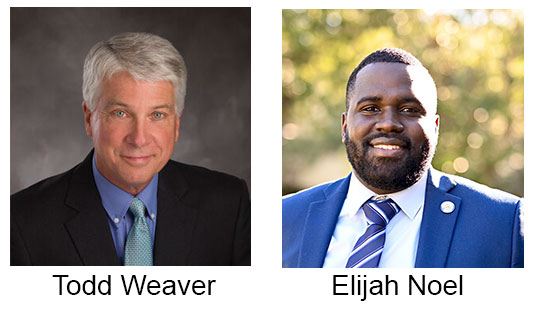
In recent forums and debates, Weaver, who is running for his second term, touted his record on issues such as green space and development and endorsed all six city charter amendments on the ballot. An aerospace and mechanical design engineer, he attended the University of Central Florida.
Noel, a 2020 Rollins College graduate with a degree in international business, sees little to like in the current commission. He accused the board of seeking more green space than the city needs and trying to concentrate power in the hands of a few. He asked for the votes of people “discontented with what the city commission is doing.”
A two-year resident of Winter Park, Noel manages a downtown Orlando lounge. He previously worked on the campaigns of former mayor Steve Leary and commissioner Sarah Sprinkel. “I’m running because I’ve noticed a lot of change in the mindset of the city commission, a change from forward thinking to a lot more stagnation,” he said.
Weaver, on the other hand, said he is proud of the current commission and its handling of pandemic-related economic challenges and development. In an effort to achieve unanimous votes, he said, the commission often negotiates during debate on decisions. “Everyone gives and takes a little bit. That was lacking when I first became commissioner.” Weaver has lived 25 years in his Lake Bell neighborhood, which was annexed into Winter Park in 2004.
SEAT 3 UNANIMITY
 In the Seat 3 race, Anjali Vaya and Kris Cruzada both have expressed support for buying the Winter Pines golf course. Both said the Post Office should stay at its current downtown location if possible, but the city should be prepared to negotiate if the Postal Service decides to move. If the city acquires the site, they both said, the land should become green space. Both endorse the proposed charter amendments on the March 8 ballot.
In the Seat 3 race, Anjali Vaya and Kris Cruzada both have expressed support for buying the Winter Pines golf course. Both said the Post Office should stay at its current downtown location if possible, but the city should be prepared to negotiate if the Postal Service decides to move. If the city acquires the site, they both said, the land should become green space. Both endorse the proposed charter amendments on the March 8 ballot.
The two bring differing backgrounds and professional experience to the race, however. Cruzada has degrees and work experience in both accounting and law — skills he says would serve him well as a commissioner dealing with budgets, financial analyses, codes and statutes. He has a sole-practice law firm and also is a director in a family-owned land-management business. Cruzada spent his childhood in Winter Park and moved back in 2006. He serves on Orange County’s Development Advisory Board.
Vaya’s strength is in technology. After earning a master’s degree in healthcare administration and working in that field, she developed a furniture e-commerce website and then formed a technology consulting business in the Northeast. A native of Zambia, she became a U.S. citizen in 1999 and moved to Winter Park in 2007. She says her ownership of two technology businesses helps her understand the needs of small business and the importance of good communication. She is vice-president of the Indian American Chamber of Commerce and sits on the citizen advisory board to Winter Park’s Community Redevelopment Agency. She ran unsuccessfully for the Orange County Commission in 2020.
GREEN SPACE A BIG ISSUE
In debates, Noel has accused the city of wasting money turning the Progress Point lot on Orange Avenue into a park and buying the Winter Pines Golf Course when the money would be better used to fix roads and sidewalks. “We’re spending a lot of money on a lot of property we can’t afford to maintain.” Calling himself a “huge advocate for green space,” he said he would emphasize quality over quantity.
Weaver made no apologies for wanting to add more green space. “I want to keep the park in Winter Park.” The city has a budgeted schedule for repaving its hundreds of miles of roads and it already owned the Progress Point site, he said. The city won’t need taxpayer money to buy the Pines golf course or maintain it because “it’s a profitable business,” he said.
Both Vaya and Cruzada agreed with the commission’s desire to buy the Pines golf course and described the $7.4 million purchase price as a good deal. Vaya praised the commission for its debate on the deal. “There was a lot of dialogue and transparency in the meeting that night.” Cruzada, who lives along the golf course, said the city followed the rules. He noted that the city charter doesn’t require referendum approval to buy parkland. He said the city should identify more money-making opportunities at the course so it can pay back the bond issue quickly.
ORANGE AVENUE OVERLAY
Noel criticized the city commission for rejecting a task force’s advice for the redevelopment of Orange Avenue. If elected, he would “listen to the experts,” he said. “It’s our job as leaders not to assume we’re experts on building and zoning codes, but to study on it, listen to residents and make the best judgments.” The city should install a money-making use at Progress Point Park to help pay for its maintenance, he said, so it is “not just another park with more trees.”
Weaver said the commission was justified in repealing the initial Orange Avenue redevelopment plan, which was proposed by property owners and recommended by city staff. “It was very controversial.” The current plan is “more fair,” he said. He noted that the revised version includes incentives for developers to provide workforce housing.
CHARTER AMENDMENTS
Weaver and Cruzada described as “no brainers” the charter amendments requiring four votes for irreversible decisions. They both gave examples. “We don’t want to make it easy to build in wetlands,” Weaver said. Four votes would ensure that the city has a compelling reason for selling its property, Cruzada said. “Once you sell, you can’t get it back,” he said.
Vaya noted that the city previously required supermajority votes for such decisions. Asking voters to put the requirement in the city charter “will go a long way in protecting the city’s charm” and will reduce divisiveness, she said. Noel opposes all six amendments. He described the charter changes as a way of “keeping the power in one place” and reiterated that the city isn’t “hearing enough from its residents.
To comment or read comments from others, click here →

by Anne Mooney | Jan 31, 2022 | Zoning and Development
Winter Pines Golf Course Has Good Round
by Geri Throne / January 31, 2022
Now that Winter Park commissioners have decided to pursue buying the 18-hole Winter Pines Golf Course, the next step is how to pay for it.
A 20-year municipal revenue bond is likely. A price tag of $7.4 million would give the city a busy 18-hole public golf course, pro shop/snack bar, driving range and maintenance buildings and equipment.
In recent years, the privately-owned course has netted more than $600,000 annually. Even if that revenue drops, city staffers told commissioners last week, it should be enough for the debt service. A bond issue would not require voter approval because it is for parkland.
Redevelopment Pressure
Despite concerns about future costs and a waning national interest in golf, commissioners were attracted by the opportunity to add 93.13 acres to the city’s green space and stop owners’ attempts to redevelop the site.
Over the past three years, Winter Pines golf course owners have twice approached the city with plans to convert all or part of the site’s zoning from parks-and-recreation to residential. Each time, they withdrew after learning about impediments to redevelopment in the city’s comprehensive plan for future land use.
The comp plan, as it is called, guides important city policy decisions about growth and change, but the document isn’t set in stone. Right now, all it takes is a simple majority vote of three commissioners to revise it. Proposed city charter amendments on the March 8 ballot would set a higher bar for major revisions. For example, applications to turn parkland into a subdivision would require a supermajority of four votes to pass. Such requests could still be approved, Mayor Phil Anderson points out, but they’d face higher standards. “For me, as a resident, anything that makes a significant and irreversible change to the city deserves a higher standard of care. The key for me is, is it irreversible?”
City commissioners hope the purchase of the course guarantees it remains open space. If it stays in private hands, redevelopment pressure is sure to continue, City Manager Randy Knight told commissioners. The reason is simple economics. Rezoning the land into developable property would make its value leap to $30 million – more than five times its value as a golf course.
An Offer to Sell
Negotiations for the purchase began months ago, after the owners presented an offer to sell the city the golf course. The $7.4 million price tag mirrors the $14.8 million that Seminole County paid last year for two courses. The Pines owners asked for more than the $5.8 million assessed value because it is giving up potential development rights, Knight said.
Commissioners unanimously agreed on entering the contract. Commissioner Carolyn Cooper expressed the most reservations. The city needs to be ready to make improvements to the property to enhance its revenue, she said, noting that the sport of golfing has seen a “serious decline in participation” since 2008. “I don’t want taxpayers to have to subsidize yet another golf course,” she said.
Abandoned golf courses have become a national trend as the sport’s popularity has declined. Some owners have redeveloped the land into everything from homes to detention ponds. Some owners have just walked away. Others have sold the courses to cities and counties, which either convert them into public open space or keep them open. That’s what happened in Seminole County, where cities and the county have bought up five privately owned courses since 2015.
Commissioners envisioned a number of additional uses for the Pines property under city ownership, from a restaurant to Frisbee golf. They agreed with Commissioner Sheila DeCiccio that a citizen advisory board be created to assist with the transition to a city-owned facility.
Commissioner Marty Sullivan supported the purchase, even if the course ends up costing taxpayers money to maintain. “There is that risk of it potentially costing us. I am okay with the risk because green space costs us money. It’s an asset to the city and residents.”
As the hearing last week drew to a close, city planner Jeff Briggs added his personal endorsement. “I’ve been coming to these meetings for 40 years. Rarely does the city commission get a chance to make a decision that’s forever. We need to celebrate.”
To comment or read comments from others, click here →
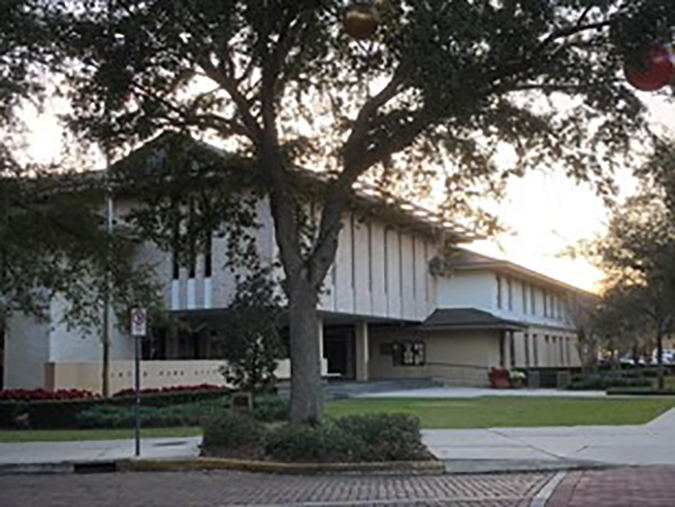
by Anne Mooney | Jan 23, 2022 | News
Will City Hall Be Designated a Historic Landmark?
Commission Will Vote on Resolution at Jan. 26 Meeting
by Anne Mooney / January 23, 2022
The Historic Preservation Board has brought forward its unanimous recommendation that the City of Winter Park add Winter Park City Hall to its Register of Historic Places. The Commission will vote on the resolution at the January 26 meeting. Readers are urged to let Commissioners know their thoughts by writing mayorandcommissioners@cityofwinterpark.org
Designed by Unique Architects Collaborative
Built in 1964, Winter Park City Hall was designed by the Winter Park Architects Collaborative, a group of local architects with national reputations. They were George Tuttle, Jr., John Langley, James Gamble Rogers II, Nils Schweizer, Gordon Orr, Jr., Clifford Wright and Fred Owles, Jr.
Mid-Century Modern Architecture
The City Hall building is a classic example of Mid-Century Modern architectural style. The two-story scale is compatible with the village scale of Park Avenue. Generous setbacks from Lyman and Park Avenues mirror the open green space of Central Park.
Roof Raised in 1978
Originally, the west wing of City Hall was one story, but in 1978 that structure was increased to two stories by raising the 80-ton roof some 14 feet to create the City Hall we see today.
City Hall Meets the Criteria for Historic Designation
To be designated a historic landmark, a building must possess “a quality of significance in American history, architecture, archeology, engineering, and culture. . . .” The building also must fit at least one of the following additional criteria:
- An association with historic events, or
- An association with the lives of significant persons, or
- Possess high artistic values, or
- Represent a significant and distinguishable entity . . . .
A great deal of history has been created within those walls over the past 57 years. The Architects’ Collaborative is a unique effort and the style of the building they created is significant, especially to those of us who live in Winter Park.
To comment or read comments from others, click here →

by Anne Mooney | Jan 17, 2022 | Election
Winter Park Candidate Forum
Meet the Candidates for Commission Seats 3 and 4
To comment or read comments from others, click here →

by Anne Mooney | Jan 13, 2022 | Election
Charter Amendments on March Ballot
Voters Will Decide on Super-Majority Voting Requirements
by Anne Mooney / January 13, 2022
In addition to choosing candidates for Commission seats #3 and #4, the March 8 ballot will ask voters to decide on six amendments to the City Charter requiring a Super-Majority vote in certain instances. The so-called Super-Majority is four out of five Commission votes; currently, Commission actions need only a Simple Majority of three out of five votes.
Winter Park goes back and forth on the subject of Super-Majority votes. The last time it came around was in 2014, when the Commission passed an ordinance abolishing Super-Majority votes. What one Commission can enact, the next Commission can repeal.
Only voters can decide
This time, instead of having the Commissioners decide by ordinance, the Commissioners have chosen to let the voters decide the question in the form of amendments to the City Charter. Charter Amendments passed by voters can only be repealed by voters.
Super-Majority votes can be wonky, boring, complicated subject matter – and it can also have a profound effect on the way our City will develop and grow into the future.
The ballot questions ask voters if they want a higher bar — four out of five Commission votes — in six distinct situations. To cast informed votes, voters must understand each situation – so hang in there.
All ballot questions will refer to Sections 2.08 and 2.11 of the Winter Park City Charter. We have left out that verbiage here to save your eyes and your patience, but you will see the language on the ballot. To read the full ballot questions, click here: https://cityofwinterpark.org/government/election-info/. This language also will appear on Sample ballots, which will be mailed February 18.
Question #1 – Sale of City-Owned Property
“Shall . . . the Charter be amended to require at least four of five members of the city commission to vote in favor to approve the conveyance of . . . city-owned property?”
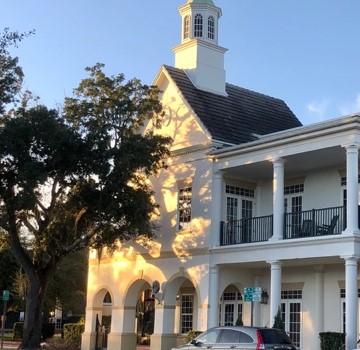
Welcome Center
Simply put, if the City wanted to sell a piece of property it owns, like City Hall or the Welcome Center, four Commissioners would have to vote in favor.
Question #2 – Rezoning Parks & Public Lands
“Shall . . . the Charter be amended to require at least four of five members of the city commission to vote in favor to (i) approve . . . rezoning of city-owned park land; and (ii) approve rezoning or change of use of land currently zoned public and quasi-public district or zoned parks and recreation district.”
The rezoning of parks and recreation land is pretty straightforward. If this amendment passes, parks and recreation land, such as the West Meadow, could not be changed to another use without four of the five Commission votes.
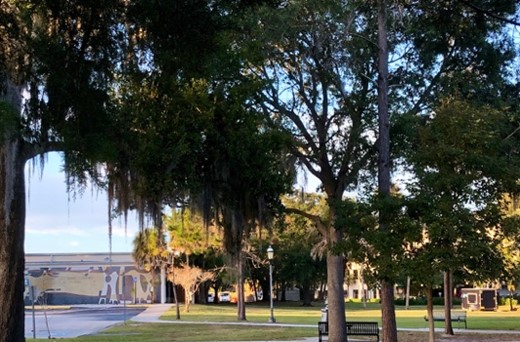
West Meadow
Public and Quasi-public (PQP) rezoning is more complicated, as it is not limited to uses one might ordinarily associate with public spaces. PQP zoning can include schools and uses associated with schools, like gyms, dorms, bookstores, dining halls, theaters etc., post offices, parking lots, museums, medical care facilities, nursing and convalescent homes and assisted living complexes, public utility services, uses in performance of governmental services, churches and community service organizations, along with a host of uses associated with facilities of this sort.
Commissioner Carolyn Cooper said of this proposed amendment, “I do think changing use in property that is currently serving the public and creating part of our collective public realm should receive the support of an overwhelming majority of local leaders before its use is redirected.” Cooper also pointed out that many of the PQP uses serve only a narrow group and pay no taxes.
Question #3: Residential and Lakefront Property Map Amendments
“Shall . . . the Charter be amended . . . [for] rezoning (i) from a residential to a non-residential category, or (ii) lakefront property from a residential use to a commercial use, mixed-use, medium density residential use or high density residential use?”
 This amendment would make it more difficult for higher density types of development of single-family residential property, particularly lakefront single-family residential. It would also provide increased protection for residential communities against commercial encroachment.
This amendment would make it more difficult for higher density types of development of single-family residential property, particularly lakefront single-family residential. It would also provide increased protection for residential communities against commercial encroachment.
Question #4: Density and Intensity Increases
“Shall . . . the Charter be amended . . . rezoning that increases the maximum allowed residential units per acre (density) or floor area ratio (intensity) by more than twenty-five percent from the existing maximum allowed density or intensity of use?”
This amendment would require four of the five Commission votes to increase density (units per acre) and intensity (square footage) of development by more than 25 percent.
Question #5: Development in Wetlands
“Shall . . . the Charter be amended to require at least four of five members of the city commission to vote in favor of . . . development within wetlands?”

Question #6: Ordinance Changes During Adoption Process
“Shall . . . the Charter be amended to require an additional public meeting and reading of a proposed ordinance . . . if, during the adoption process either (i) a substantive or material change is made, or (ii) a change is made to a proposed zoning or comprehensive plan amendment ordinance resulting in an increase in the maximum allowed density or intensity of uses or a change to the permitted uses?”
If, in the process of adopting an ordinance, a substantive change occurs in the language of the proposed ordinance, the meeting at which the change occurs will be considered the “First Reading” of the ordinance, and there will be an additional noticed public meeting and another Reading and the public will have the opportunity speak to that change.
To comment or read comments from others, click here →

 In the Seat 3 race, Anjali Vaya and Kris Cruzada both have expressed support for buying the Winter Pines golf course. Both said the Post Office should stay at its current downtown location if possible, but the city should be prepared to negotiate if the Postal Service decides to move. If the city acquires the site, they both said, the land should become green space. Both endorse the proposed charter amendments on the March 8 ballot.
In the Seat 3 race, Anjali Vaya and Kris Cruzada both have expressed support for buying the Winter Pines golf course. Both said the Post Office should stay at its current downtown location if possible, but the city should be prepared to negotiate if the Postal Service decides to move. If the city acquires the site, they both said, the land should become green space. Both endorse the proposed charter amendments on the March 8 ballot.




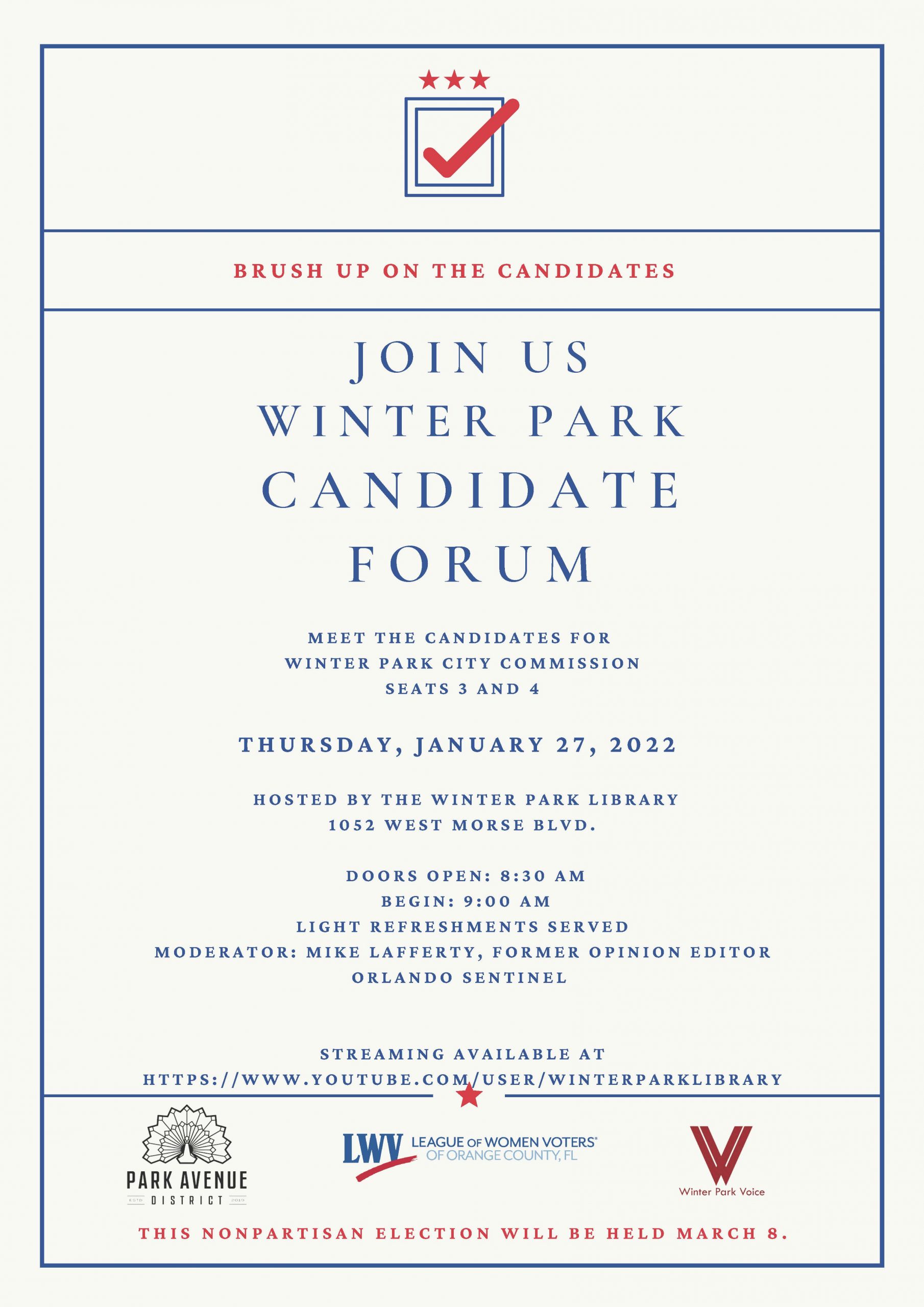




Recent Comments